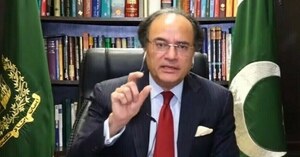Adding to an unenviable list of challenges that already includes earthquakes, sectarian violence and an economy teetering near collapse, Pakistan's leaders are attempting to open a new round of high-stakes peace negotiations with homegrown insurgents, the Tehreek-e-Taliban Pakistan (TTP).
The United States cannot do much to help these talks succeed, but President Barack Obama should use today's summit with Prime Minister Nawaz Sharif to ensure that if Pakistan's Taliban talks fail, they fail in ways that unite mainstream Pakistanis in the fight against violent extremism rather than creating new rifts between Washington and Islamabad.
Unlike the Afghan Taliban groups that have had a live-and-let-live arrangement with Pakistani authorities, directing their violence beyond Pakistan's borders, the TTP has conducted attacks with devastating effect on the Pakistani military and government, as well as innocent civilians. Pakistan's army chief, General Ashfaq Parvez Kayani, describes the group as the state's top security threat. And because Pakistan is a nuclear-armed, fast-growing state of nearly 200 million citizens that borders India, China, Iran and the Arabian Sea, the TTP's disruptive potential also threatens US security.
Peace talks are not, in principle, a bad idea. If Pakistan can talk its way to peace with the TTP without jettisoning its constitution along the way - it should. That said, it is nearly impossible to believe the TTP, a group that has so far shown itself hostile to any serious reconciliation with Islamabad, would now put down its arms and play by democratic rules.
Sooner or later, these parleys are almost certain to fail. The crucial issue for Washington is how that failure unfolds. Two historical examples are illustrative. In 2009, an earlier deal with militants based in Swat Valley collapsed after it became clear that government compromises had only emboldened the Taliban to seize ground and impose a reign of terror. That deal, though, failed in the best possible way: It clarified the Taliban's anti-Pakistan (not just anti-US) character and established popular support for the army to move in and roll back Taliban advances.
Unfortunately, four years later it appears that Pakistanis need to relearn similar lessons - in part because of the effective politicking of Pakistan's charismatic cricket-star-turned-opposition-politician, Imran Khan. Khan and his supporters claim that Pakistan's Taliban insurgents are motivated by external, particularly American, interference in Pakistan, whether in the form of drone strikes, covert operations or military incursions along the Afghan border.
If TTP talks again fail in ways that expose the group's true, anti-state colours, the appeal of Khan's message would likely fade and the army could anticipate broad support for new counter-TTP operations. Peace talks, worryingly, could also fail in dangerous ways. In 2004, the first US drone strike in Pakistan killed Nek Muhammad, an al Qaeda-linked Taliban commander who had just concluded a peace deal with the Pakistani army. Rightly or wrongly, Khan is far from the only Pakistani pointing to that episode as evidence that the United States aims to pit Pakistanis against each other. Therefore, Khan argues, rejecting co-operation with the United States is Pakistan's best course of action.
If Washington again offers Pakistanis such easy reasons to blame the United States for failed peace talks, it would not merely exacerbate (already rabid) anti-Americanism. Far worse, it would distract and confuse the public debate on pressing domestic security issues, dissipate national unity and undercut political and military leaders who would otherwise favour forceful operations when negotiations break down.
In an ideal world, Washington would avoid even the appearance of impropriety with respect to these talks. US officials would go silent - just as they smartly did prior to Pakistan's elections last May. In addition, US drone strikes would cease until the insurgents ruin the process on their own. In reality, however, the situation is not so simple. Islamabad's talks with the TTP are only one piece in the wider puzzle of war and counter-terror missions that Washington faces in Pakistan and neighbouring Afghanistan. Charged with these other difficult assignments, US defence and intelligence officials are loath to relinquish drones. For they believe drones provide the best - and often the only - way to attack adversaries holed up inside Pakistan's tribal belt.
These issues will likely come to a head when Sharif visits the White House today. Obama should use their meeting to offer a compromise: US drones will target only a negotiated short list of senior al Qaeda leaders while the TTP talks continue if, in return, Sharif ends Pakistan's public opposition to drones (including in the United Nations). Pakistan must begin to discuss a comprehensive counter-terror partnership with the United States for the future.
Like any good compromise, it would be painful for both sides. But it would also lay the groundwork for significantly better US-Pakistan dealings over the long haul - even as it improves the odds that this round of TTP peace talks fails in the best possible way.
BR100
15,085
Increased By
112.5 (0.75%)
BR30
44,012
Increased By
987.7 (2.3%)
KSE100
148,618
Increased By
1274.3 (0.86%)
KSE30
45,248
Increased By
370.7 (0.83%)





















Comments
Comments are closed.